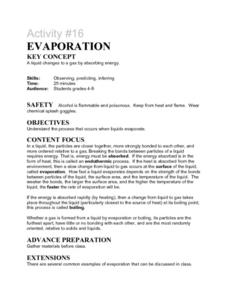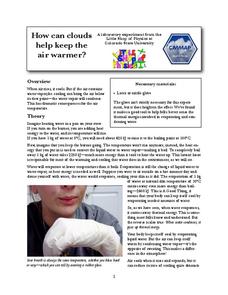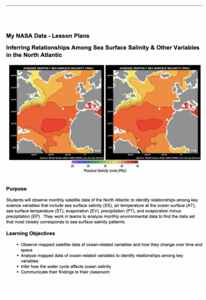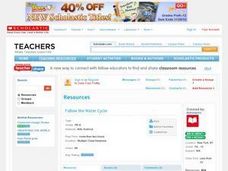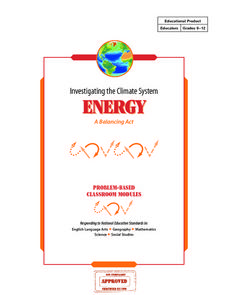American Chemical Society
Recrystallization Test
Crystallize the answer to the question that has been investigated since the first of four lessons: What is the unknown crystal? Pupils have examined, crushed, and dissolved four samples plus an unknown as an exploration of the properties...
Curated OER
Evaporation of Alcohol and Water
Students investigate the process that occurs when liquids evaporaate. They test water and alcohol to determine which substance evaporates more quickly and relate the rate to energy changes.
Curated OER
Evaporation and Condensation
Students explore how temperature effects the processes of evaporation and condensation and how the air may be polluted by the evaporation of certain compounds. In this temperature lesson students complete a lab and a worksheet.
Colorado State University
How Can Clouds Keep the Air Warmer?
Condensing water warms the air around it. Young scholars consider this concept as they experiment with air temperature around evaporating and condensing water vapor. They simulate the formation of clouds to experience the associated...
Curated OER
Physical Changes and States of Matter - Two
Here's a wonderful lesson on how substances change states. Groups of learners are given trays with a chocolate bar, a piece of paper, an ice cube, and a balloon. During the activity, the groups closely observe the changes that each...
Curated OER
Gravimetric Determination of the Nonvolatile Content of Paint
Here are the instructions for leading your advanced chemists though the process of measuring the nonvolatile components in a sample of paint. No student handout is provided, so you may want to create one based on the procedure explained....
Alabama Learning Exchange
WATER You Doing to Help?
Auntie Litter is here to educate young scholars about water pollution and environmental stewardship! Although the 15-minute video clip is cheesy, it's an engaging look at the water cycle and conservation. Learners start by illustrating...
Signing Time Foundation
What is the Water Cycle?
Dive into an exploration of the water cycle cycle with this simple earth science lesson. After first discussing where rain comes from, young scientists define the terms condensation, evaporation, transpiration, and precipitation as a...
American Chemical Society
The Water Cycle
Bring the water cycle into the classroom without the mess. Learners build a model of the water cycle using everyday materials. They observe the process of evaporation and condensation and relate their observations to the larger scale...
American Chemical Society
Dissolving and Back Again
From solid to liquid and then back again. Young scientists dissolve salt in water and then evaporate the water while observing what happens to the solute. They use their observations to make predictions about other solutions.
NASA
Inferring Relationships Among Sea Surface Salinity & Other Variables in the North Atlantic
Some say a picture is worth a thousand words—even from a hundred miles away! Learners review satellite data to analyze ocean variables such as temperature, salinity, evaporation, and precipitation. They look for patterns in the data and...
Curated OER
Follow the Water Cycle
Students explore the stages in the water cycle, evaporation, condensation, and precipitation. They hypothesize about the source of rain and search for forms of water on Earth.
Curated OER
The Potential Consequences of Climate Variability and Change
Learners analyze the impact of climate variability and change utilizing a broad span of topics over a wide range of grade levels. This three lesson unit is easily adapted for the various instructional levels listed.
Curated OER
The Water Cycle
An inventive and interesting lesson on the water cycle (and other cycles associated with it), is here for you. After doing a well-designed hands-on inquiry in class, learners also identify organisms and processes that are involved in the...
Curated OER
Investigating the Climate System: Energy, A Balancing Act
Earth science explorers design an experiment to demonstrate that the albedo of a surface affects its temperature. They test to find out if moisture on the surface affects temperature. They discover whether or not concrete or asphalt heat...
Curated OER
The Atmosphere and Flight
Students investigate evaporation and condensation, and apply the concepts to understanding cloud formation.
Curated OER
How Do You Dew?
Students examine how the processes of condensation and evaporation occur. They describe the relationship between heat energy, evaporation and condensation of water on Earth. They give examples of the processes of evaporation and...
Curated OER
Watercycle
Third graders examine the natural circulation of water from oceans, lakes, and rivers to evaporation into the air, and then to condensation to produce rain falling back to the soil as components of the water cycle.
Curated OER
Rain Machine (Solar Still)
Students experiment with a solar still. In this distillation lesson plan, students find a simple way to use evaporation to make salty water drinkable.
Curated OER
Rain, Rain, Go Away
Students conduct a number of experiments involving evaporation and condensation. They view and discuss a video about the water cycle and then design posters about the rain based on the book "Cloudy With A Chance of Meatballs".
Curated OER
Lesson 4 Lesson 2(cont.) Its a Small World (Day 4)
Students watch and discuss observations of condensation on the plastic "sky" of the container. They draw a sketch of what they see and record their observations on the Its a Small World mini booklet. Sudents investigate evaporation...
Curated OER
Physical Changes and States of Matter
Fourth graders study evaporation and condensation as parts of the water cycle. First they determine the similarities and differences between a cup of water and an ice cube before measuring the volume of ice before melting it, and...
Curated OER
The First Farmers
Students show how constant irrigation, with repeated evaporation of water that left salts in the soil, eventually ruined much farming land in southern Mesopotamia. They discuss the idea that with the development of irrigation people...
Curated OER
Moist Air & Clouds
Fifth graders study the weather and water cycle of clouds. In this water cycle lesson plan, 5th graders read background information about evaporation, condensation, and the states of water.
Other popular searches
- Water Cycle and Evaporation
- Evaporation Experiment
- Evaporation and Condensation
- Condensation Evaporation
- Evaporation Kindergarten
- Heat and Evaporation
- Water Evaporation
- Melting and Evaporation
- Science Evaporation
- Filtration and Evaporation
- Condensation Evaporation Dew
- Evaporation and Temperature



